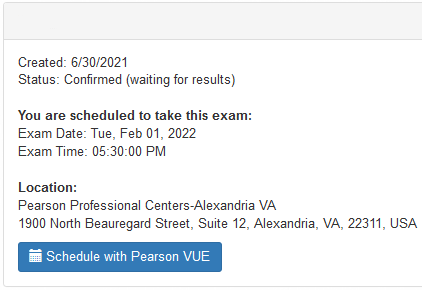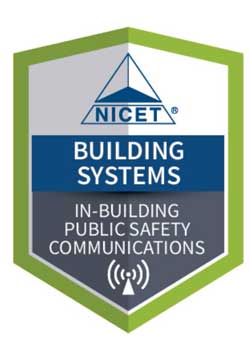In-Building Public Safety Communications (IB-PSC)
 This certification program is for engineering technicians engaged in the design and layout, and installation and maintenance, of in-building public safety communication systems. Technical areas covered include knowledge of ERCES, radio frequency theory, equipment mounting requirements, delivered audio quality scale, business software and mathematics, communications using project specifications and documents, site survey data and design tools, and interpretation and evaluation of surveys. The program has a three-level technician installation track and a one-level Design track that may be used independently or together to establish minimum qualifications for appropriate roles.
This certification program is for engineering technicians engaged in the design and layout, and installation and maintenance, of in-building public safety communication systems. Technical areas covered include knowledge of ERCES, radio frequency theory, equipment mounting requirements, delivered audio quality scale, business software and mathematics, communications using project specifications and documents, site survey data and design tools, and interpretation and evaluation of surveys. The program has a three-level technician installation track and a one-level Design track that may be used independently or together to establish minimum qualifications for appropriate roles.
Successful candidates must pass an exam or exams, complete a work history description that documents and meets specific industry related experience, successfully perform key role-specific activities, and obtain a personal recommendation (Levels III and Design). Once earned, certification must be maintained through Continuing Professional Development (CPD) and recertified every three years.

The In-Building Public Safety Communications exam is delivered on a computer at Pearson Vue Testing Centers. Computer-based testing (CBT) allows NICET to extend several benefits to our customers: more flexible exam dates and appointment times; immediate scheduling and confirmation; and quicker exam scoring.
NICET has updated the In-Building Public Safety Communications (IB-PSC) exams on December 2nd 2024. Questions that were previously referencing NFPA 1221 (2019) have been updated to NFPA 1225 (2022).
Certification Requirements
Application Procedures
Performance Measures
Take a Practice Test
Listing of references allowed in testing centers and other resources that might be useful in preparing for an exam.
Level I
Level II
Level III
Design
Title Page - Edit and print this page with the information about the reference, according to the standard
Take a Practice Test
Standard Model Programs
| Standard Model/CBT Application | |
| Level I | $230 |
| Level II | $300 |
| Level III | $355 |
| Design | $355 |
Rescheduling for all NICET tests more than 24 hours before your exam date is complimentary in the same testing window. Please contact PearsonVUE.
Within 24 hours after your scheduled date or for a new testing window, there is an additional fee equal to one half of the original testing fee. For more information on rescheduling, click here.
Rescheduling your NICET exam has never been easier, and in most cases, does not incur any additional fees. Additional fees may apply if rescheduling is attempted within 24 hours of the appointment time, the eligibility window expires, or there is less than 24 hours until the eligibility expires.
The best way to reschedule your exam is to login to your NICET account and click “Schedule" in the left side navigation, then “Schedule with Pearson VUE” for the exam you want to reschedule.

Click the exam name to view the appointment, then “Reschedule” on the right side of the screen.
Caution: Just like the original scheduling process, there are several screens, agreements, and confirmations. The process is not complete until you click the “Confirm Reschedule” button, see the notice “Your Appointment is Rescheduled”, and receive a confirmation email directly from Pearson Vue. Taking a screenshot of this process is not acceptable. Failure to complete the process and missing your appointment does incur a rescheduling fee.
You may also call Pearson VUE at 1-866-880-0048 to reschedule. However, significant wait times can occur.
Candidates who are testing using the online remote proctored (OnVue) option may reschedule their appointment date/time right up until their appointment without incurring additional fees. Just follow the same process as detailed above.
What is the Test Like?
The exam will be administered on a computer at a proctored test center managed by a test administration company. The content outline and reference list for the program will serve as the guide to what will be covered on the test.
Each test session begins with a tutorial allowing you to get used to the process. During the test, you will see one question at a time, but can move forward or backward to view or review other questions. Some questions include a graphic or document to be viewed by clicking on the exhibit button. Exhibits may be in color. Answer options will usually be selected by clicking the boxes or circles next to the answers. For a few questions, you may be presented with a picture and asked to click on the part of the picture that correctly answers the question. Questions may have more than one correct answer, but in those cases, you will be told how many answers to choose. You will receive an unofficial score report at the conclusion of your test session.
| In-Building Public Safety Communications Exams | |
| Level I Exam | 88 questions, 110 min. |
| Level II Exam | 143 questions, 155 min. |
| Level III Exam | 126 questions, 170 min. |
| Design | 110 questions, 150 min. |
To apply, click here.
NOTE:
You will be required to sign an NDA (Non-Disclosure Agreement) to begin your exam. Failure to accept will result in a failed score and fees will be forfeited. The NDA that will be displayed is:
“You must accept the Non-Disclosure Agreement (NDA) below in order to take this exam.
I understand that NICET tests and test questions are owned and copyrighted by NICET and affirm that I will not share the content of any NICET examination with any other person. I acknowledge that divulging the contents of this examination to others in any manner is expressly forbidden and may subject me to sanctions.”
Your appointment time will be 10 minutes longer to cover an introductory tutorial section before your exam begins. Any unused time will NOT extend the time allotted for answering exam questions.
Test Time
Your appointment time will be 10 minutes longer to cover an introductory tutorial section before your exam begins. Any unused time will NOT extend the time allotted for answering exam questions.
Exams with scheduled breaks will be marked with an asterisk in the list above. Outside of these scheduled breaks, candidates taking any exam at any level may take unscheduled breaks, but the exam clock will continue to run.
Calculators
A calculator is built into the exam. Please see the CBT Calculator Preview for information about the onscreen calculator. Candidates may not bring any personal calculators into the testing room.
Applicants with a disability as defined in Title III of the Americans with Disabilities Act who may be placed at a disadvantage when taking a NICET certification examination may request a testing accommodation by contacting test@nicet.org prior to scheduling testing. Each request will be evaluated individually and every effort will be made to offer reasonable accommodations to qualifying applicants. There will be no additional charges to qualifying applicants for these accommodations. NICET will contact the applicant to arrange a mutually suitable accommodation.
Job Task Analysis
The program was developed in cooperation with the Safer Buildings Coalition. In January 2020, a group of Subject Matter Experts (SMEs) met to perform a Job Task Analysis (JTA) for the National Institute for Certification in Engineering Technologies’ (NICET) In-Building Public Safety Communications (IBPSC) Certification. During the JTA, the meeting participants identified all of the duties and tasks performed by IBPSC professionals, as well as the underlying knowledge, skills, abilities, and attributes required to perform those tasks. Although there are multiple methods for conducting job analyses, for this job analysis the DACUM method was used. DACUM, an acronym for Developing A CurriculUM, is a JTA process that analyzes a job role or a profession systematically.
Validation Survey
Following the meeting, two online surveys were created to validate the results of the JTA and finalize an examination blueprint for the development of a certification program for those working with In-Building Emergency Responder Communication Enhancement Systems. The online survey was administered to IBPSC professionals across the United States. Survey participants were asked to rate each of the job tasks using two rating scales – time spent and task importance. A total of 246 In-Building Emergency Responder Communication Enhancement Systems professionals responded to the surveys.
Post-Survey Review Meeting
Following completion of the survey validation study, members of the DACUM committee reviewed the results from the study and finalized examination blueprints, including the number of items that should be on the credentialing exam.
Click here for an excerpt from the JTA report that shows the content outlines and the knowledge, skills and abilities for domain/sub-domain at each level.
David Adams, PCTEL, Inc
John Batista, PWR Wireless
Michael T. Cassell, Communications Electronics
Jason Chambers, Day Wireless Systems
Brett Coe, RCDD
Christopher Creamer, DynaFire LLC
Matthew DiMarco, Airtower Networks
Ron Dow
Andrew Ely, PierCon Solutions
Adam Feehan, PierCon Solutions LLC
Josh Gerst, RF Connect
Greg Glenn, Pulse Signal Solutions
Chris Godwin, RF Solutions LLC
Peter M. Goldring, SET, CFE, CAT-1, Goldring Protection
Gary Gray, City of Fort Lauderdale, Radio Systems Manager (retired)
Gabe Guevara, Westell Technologies Inc.
Steven D. Hall, Collier County Government
Nathaniel C. Hinkle
Steve Hronek, Comsec Associates, Inc.
Bob Jans, Industrial Communications & Electronics Inc.
BJ Klingensmith, APG Life Safety
Robert LaMadline, Elite Fire Safety, Inc.
Michael Littman, RF Solutions LLC
Matt Lunny, Comba Telecom Inc.
Casey McKenna, SET, ADT Commercial
Ted Metcalfe, Engineering Wireless Services
Derrick Mitchell, LS Systems
Jorge Molina, Industrial Communications & Electronics Inc.
James Moore, JM Electronic Engineering, Inc.
Michael Puskas
Mark Rice, TESSCO Technologies
Richard Roberts, Honeywell Fire Safety
Joe Rohlic, Radio One Inc.
Ernest Schirmer, WSP USA
Mike Schmitt, HCI Systems Inc.
Kevin Shea, USA Groups
Syed Sohaebuddin, Black Box Corporation
Edward Steffens, Iona McGregor Fire District
Brian Stuart, SET, ADT Commercial
Chet Taylor, ABIS Solutions
Joe Tirado, Cosco Fire Protection
Jared Vance, HUNT Electric, Inc.
John Vassel, Safety Systems Inc.
Robert Vasvary, Industrial Communications & Electronics Inc.
Corey Vaughan, PMC Associates
Kevin Vierling, Pando Telecom

